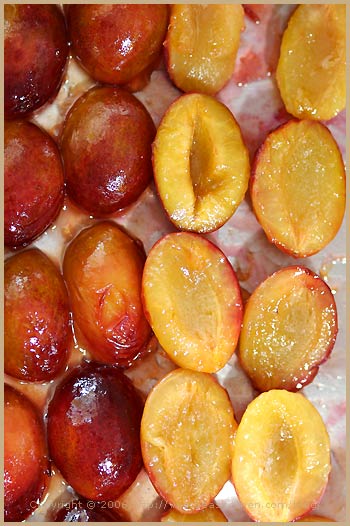
“I have eaten” begins the poem, a phrase appealing to all gourmands, arousing our curiosity before the next line tempts our eyes, our tongues, our touch: “the plums.” As the poem unfolds, we learn this fruit is “delicious / so sweet / and so cold.”
In “This Is Just To Say” by William Carlos Williams, 28 words in twelve lines say much about taste, sensuality, desire, temptation, contrition, impatience, hunger, and satisfaction. [Copyright forbids my quoting the whole poem here, so please read it at the Academy of American Poets.]
Our speaker speculates that the recipient of the message is “probably / saving / for breakfast.” The time of the poem might be night or early morning if the next meal for which the plums are “probably” being saved is “probably” breakfast. Are we reading a note on the door of the refrigerator, or are we overhearing a spoken voice, perhaps a confession to the person who has discovered our speaker standing in the kitchen, cheeks flushed and fingers dripping juice, or a whisper in the ear of a sleeping lover?
The word “delicious” is decisive, stretching over the tenth line like an outreached hand. The fruit, both “sweet” and “cold” was too tempting and was worth whatever penance the speaker will be asked to pay, perhaps expects with “Forgive me.” Our speaker likely seeks understanding, not punishment, hoping the person who chilled the plums will empathize with such temptation of the senses, the fruit irresistible but not clearly forbidden, the pleasure like the language of the poem, so simple and “so sweet.”
Perhaps our speaker says “Forgive me” at the beginning of the last stanza to acknowledge the sin of gluttony after eating more than one plum—after eating all the plums though we don’t know how many except the plural word meaning multiple—and hasn’t saved even one for the person to whom the apology is addressed. Too hungry! Too tempted! And ultimately satisfied or satiated.
The single sentence of this poem has no terminal punctuation, no official ending except for the absence of any other word after “cold” in the final line. Was the speaker discovered mid-bite of the last plum? Was the sentence interrupted by a slap, a kiss, or a healing touch? The gentle rhythms and soft syllables of the poem, like ripe plums, invite speculation (“probably”) and suggest satisfaction (“delicious”), a tribute to the sensory and sensuous, especially the sense of taste.
William Carlos Williams (1883-1963) “sought to invent an entirely fresh and singularly American poetic, whose subject matter was centered on the everyday circumstances of life,” according to his biographical sketch at the Academy of American Poets. Among these subjects were sharp visual portraits that suggested the very nature of objects and the richness of meaning surrounding them. He was also a practicing physician, a man who knew about the healing powers of the ordinary, like temptation, forgiveness, and ice-cold plums.
Google offers more than 130,000 images for plums. To complement “This Is Just To Say,” I am particularly drawn to the photograph above accompanying a recipe for Plum Clafoutis from Béatrice Peltre at her blog, La Tartine Gourmande.
Your response to this poem and post and your own favorite culinary poetry are welcome here.
- posted by Donna Reiss

1 comment:
Industrial culinary programs include information about the herbs and spices, baking tips, sample programs including pastry and culinary art and salary chart. Herbs and spices chart provided under these programs are very useful for the culinary students and chefs. Students are provided baking pan tips, bread tips, butter tips and cleaning tips with margarine and measuring tips.
http://www.culinaryschoolsprograms.com/
Post a Comment